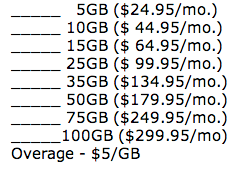People in Winthrop, Iowa and several nearby towns are mad about the price of their Internet service, and we can't blame them.
The East Buchanan Telephone Cooperative (EBTC) offers DSL Internet at sub-broadband download speeds for up to $300 a month, and it imposes data caps with overages of $5 per gigabyte. As detailed on the company's website, service starts at $24.95 for 5GB per month and moves up to $44.95 per month for 10GB, $179.95 for 50GB, and $299.95 for 100GB. Regardless of which plan you choose, going over your cap brings a charge of $5 more per gigabyte.

The base prices provide only 3Mbps throughput downstream and 1Mbps upstream. (The upload speeds are listed incorrectly on the EBTC site, but the company's GM gave us the correct numbers.) The US Federal Communications Commission defines broadband as 4Mbps download and 1Mbps upload. To get broadband download speeds from EBTC, you'd have to pay another $4.95 per month for an upgrade to 6Mbps down and 1Mbps.
That's not all. The company will charge you another $10 per month to rent a DSL modem or $69.95 to buy the modem. Naturally, there's also a $49 up-front charge to install the DSL service.
EBTC glowingly describes its DSL as being "up to 20 times faster than a standard dial-up connection! Complex graphics pop-up instantly. You can send and receive huge files in seconds. With DSL, you’ll experience the Internet the way it was meant to be experienced. And all for as little as $15.00 more per month than your standard dial-up connection!"
David McElroy isn't impressed. He filed a Change.org petition asking the DSL provider to "[s]top pricing home internet like cellular internet." The petition, which has 423 signatures, says the current prices and caps were implemented on December 26, at the same time that base download speeds rose from 1Mbps to 3Mbps. On January 9, "McElroy and approximately 25 disgruntled customers met with the EBTC Board about the issue during the Board’s regular monthly meeting," the Independence Bulletin Journal reported three days ago. McElroy lives in Dubuque, Iowa, but he said his parents, brother, and sister live in Winthrop, where he also grew up.


 Loading comments...
Loading comments...
